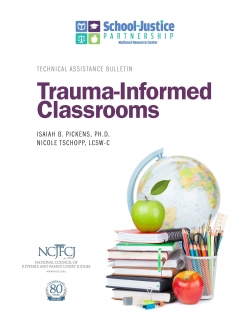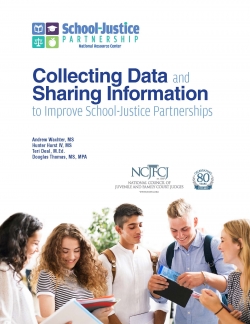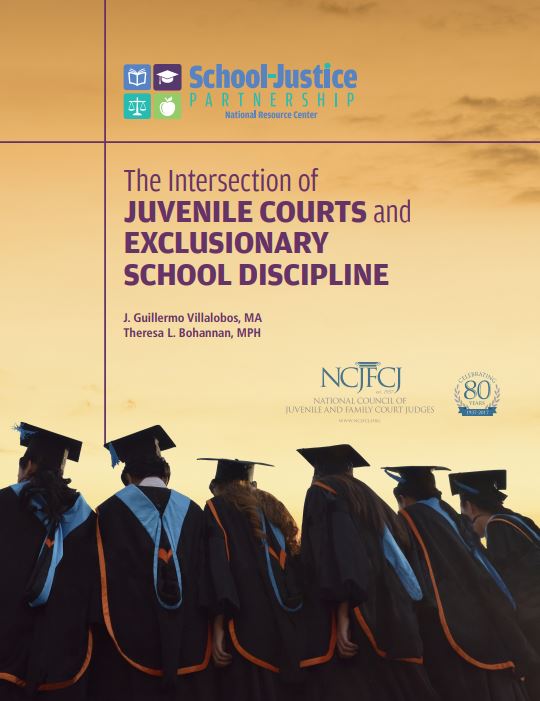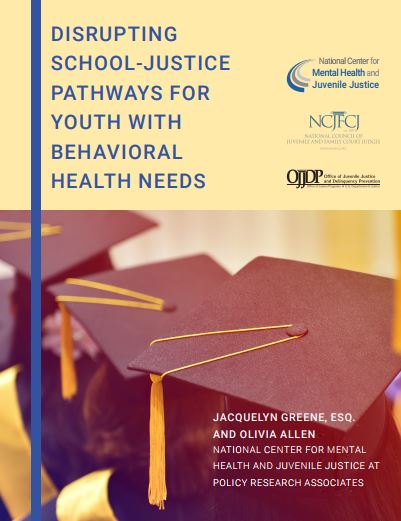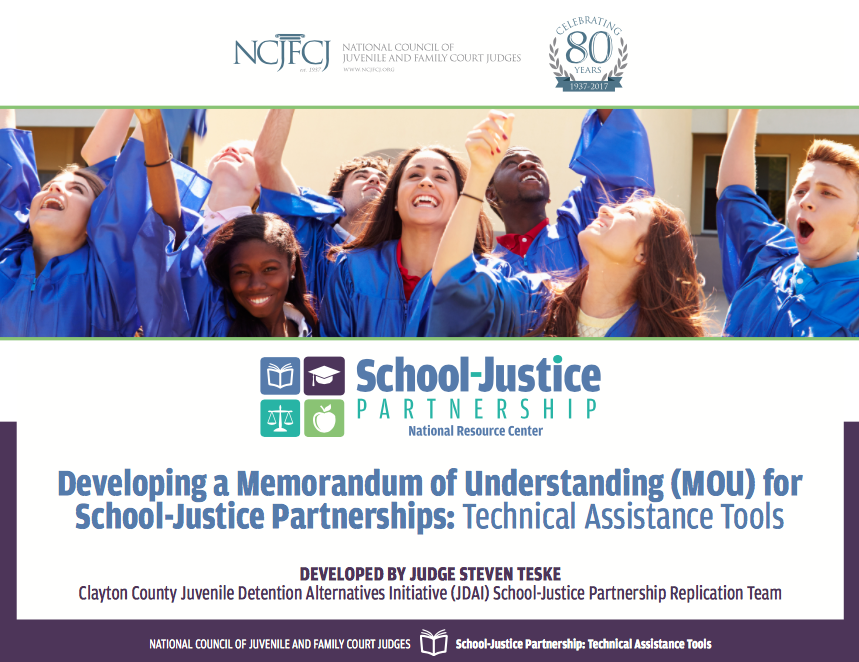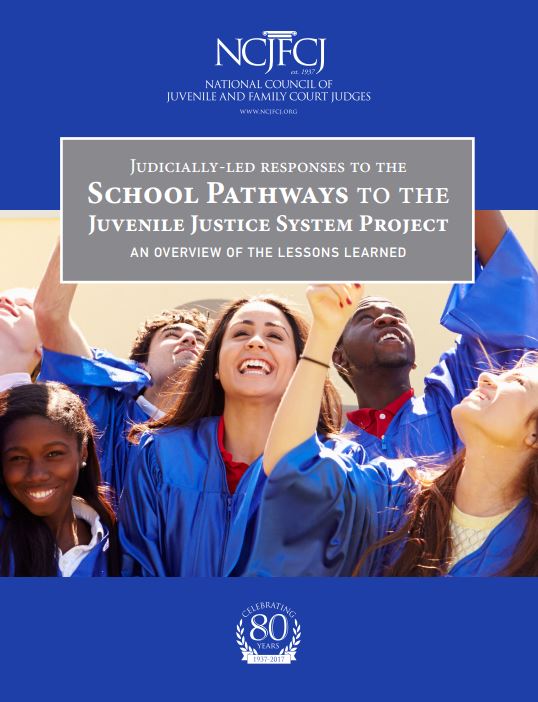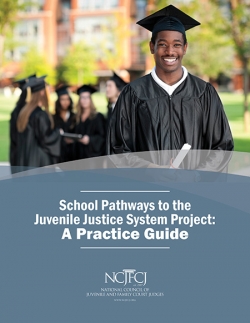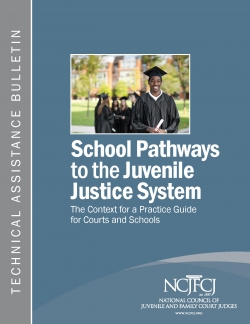Featured
Trauma-Informed Classes
The impact of students’ life experiences on their behavior has garnered increasing attention as schools strive to develop more supportive academic environments that address the needs of at-risk youth and facilitate continued academic engagement. Few events outside the classroom have as profound an impact on multiple domains of student development as traumatic life experiences.
Download ResourceCollecting Data and Sharing Information to Improve School-Justice Partnerships
Juvenile courts nationwide handle cases referred by schools for truancy or behavioral incidents. Since 2012, the National Council of Juvenile and Family Court Judges (NCJFCJ) have trained jurisdictions on strategies and policies to reduce the number of referrals to the juvenile justice system for school-based behaviors.
Download ResourceThe Intersection of Juvenile Courts and Exclusionary School Discipline
Prior to the passage of the Gun Free Zone Act of 1994 (GFZA), school administrators and educators were largely responsible for addressing student misbehavior in schools. However, since the implementation of GFZA, an increasing number of school-related issues have instead come before the juvenile courts due to highly punitive school policies and practices.
Download ResourceDisrupting School-Justice Pathways for Youth with Behavioral Health Needs
Throughout the 1990s, the rise of zero-tolerance school discipline policies resulted in the widespread adoption of strict and mandatory responses for a large range of misbehavior in school. An unintended consequence of these policies and practices were youth with behavioral health needs put at an increased risk for exclusionary discipline and school-based arrests.
Download ResourceDeveloping a Memorandum of Understanding (MOU) for School-Justice Partnerships: Technical Assistance Tools
A memorandum of understanding (MOU) is a critical document in establishing coordinated efforts in a school-justice partnership. An MOU is a multilateral agreement among multiple parties intended to express a common vision and line of action. MOUs in school-justice partnerships represent a collective commitment among schools, courts, and other relevant agencies, to adhere to specific principles and share responsibilities for the collaborative’s engagements.
Download ResourceJudicially-led Responses to the School Pathways to the Juvenile Justice System Project: An Overview of the Lessons Learn
The zero tolerance policies that were adopted by many local and state education agencies in the 1990s had the unintended effect of unnecessarily introducing low-risk youth to the juvenile justice system for disruptive behaviors that are very typical of adolescence. Despite overall decreases in juvenile delinquency referrals nationally, including arrests of juveniles for violent offenses, the proportion of referrals for non-violent acts and relatively minor misdeeds that derive from school-related incidents has remained high in many jurisdictions.
Download ResourceSchool Pathways to the Juvenile Justice System Project: A Practice Guide
The NCJFCJ has published this guide as part of a larger project addressing school discipline referrals to the juvenile justice system. The project aims to reduce the number of referrals to the juvenile justice system for school based behaviors through the establishment and collaboration of judicially led court/school partnerships. The practice guide is intended to provide the multi-system collaborative in each of the 16 demonstration sites with thorough and thoughtful guidance on implementing judicially led collaborations to address "school pathways to the juvenile justice system."
Download ResourceSchool Pathways to the Juvenile Justice System: The Context for a Practice Guide for Courts and Schools
The NCJFCJ has published a Technical Assistance Bulletin on the School Pathways to the Juvenile Justice System: A Context for a Practice Guide for Courts and Schools as part of a larger project addressing school discipline referrals to the juvenile justice system. The project aims to reduce the number of referrals to the juvenile justice system for school based behaviors through the establishment and collaboration of judicially led court/school partnerships. The bulletin was published to provide a context for courts and schools regarding the need to reduce the number of referrals to the courts, along with a history and impact of zero tolerance policies.
Download ResourceResources for Schools and Educators
Resources for Law Enforcement & School Resource Officers
Resources for Juvenile Justice Practitioners
Resources for Mental & Behavioral Health Providers
Resources for School-Justice Partnerships
Federal Initiatives
Webinars
The School-Justice Partnership Project is pleased to house a variety of recorded web-based webinars that are beneficial and intended to enhance the collaboration and coordination among schools, mental and behavioral health specialist, law enforcement and juvenile justice officials. Recorded web-based webinars will be housed in our library to provide key stakeholders with the knowledge and skills to achieve positive school discipline reforms and to improve the lives of students to succeed in school and prevent negative outcomes for youth and communities.



